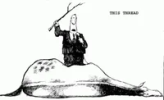The new farm will infect the last salmon of Knights Inlet, already in collapse due to salmon farms on the other side of the inlet...
'We're trying to exercise our home authority and generate revenue from our territory, which we have been legislated out of,' First Nation official said.
30 November 2021 6:01 GMT Updated 30 November 2021 14:23 GMT
By Rachel Sapin
A joint proposal submitted by the Tlowitsis First Nation and Grieg for a new salmon farm in British Columbia marks the first time that a salmon farm's water lot lease and license will belong to the Tlowitsis.
"Grieg will be allowed to grow Atlantic salmon and pay us a stipend for being in the water lot lease," Thomas Smith, councilor for the Tlowitsis Nation on East Vancouver Island in British Columbia, told IntraFish. "It's all within our traditional territory."
Its also the first time Grieg Seafood British Columbia will be contracted to grow salmon on a license owned by a First Nation partner.
With 'milestone' looming, Canada's plan to phase out conventional salmon farming in BC looks increasingly complex, report shows
Read more
The proposed Ga-guump farm would be located in the Tlowitsis traditional territory of Clio Channel.
The Tlowitsis are a British Columbia First Nation of 450 registered members. Its traditional territories span the coastal area of Northern Vancouver Island, Johnstone Strait and adjacent mainland inlets.
Canada's alignment of its federal laws in recent years with the The UN Declaration on the Rights of Indigenous Peoples (UNDRIP), as well as its commitment to reconciliation, have given First Nations in the country increasing power to exercise territorial rights in areas of British Columbia where Norway-based companies Grieg, Mowi and Cermaq have operated salmon farms for decades.
"Grieg has been wise enough to see the writing on the wall," Smith said of the newest farm proposal and why it is different than those that have come before it.
Mowi to temporarily cease operating Canada salmon hatchery, blames Trudeau administration
Read more
The search for a new beginning
The Tlowitsis were displaced from traditional territory in the late 1960s, leading the First Nation to be culturally and physically separated from the land, according to the First Nation's website.
In the spring of 2018, the Tlowitsis finalized the purchase of a 635-acre property in the Strathcona Regional District, just south of Campbell River.
The First Nation is establishing a new home community for its citizens, known as Nenagwas, or “a place to come home to” in English.
"We're trying to exercise our home authority, and generate revenue from our territory, which we have been legislated out of," Smith said.
The revenue generated from the proposed farm is set to go to housing development in that new community, including providing light infrastructure such as water and sewer lines, Smith added.
There are three Grieg farms in Tlowitsis territory.
Grieg Seafood currently has impact benefit agreements with three First Nations on both coasts of Vancouver Island, and operates 12 of its farms with the consent of these Nations, according to the company's website.
Those agreements require the proponent to provide benefits to the First Nations in exchange for support of a project, but do not necessarily guarantee ownership or operating rights.
Smith added the Tlowitsis are currently not pursuing changes to other farm agreements with Grieg.
"We've had a good working relationship with Grieg since 2014," he said. "We’ve looked at it a few times. Given the logistics and legal process, it would be complicated to do it."
The Tlowitsis still need approval from provincial authorities as well as the Fisheries and Oceans Canada (DFO) to move forward with the new salmon farm. (Copyright)
'We're trying to exercise our home authority and generate revenue from our territory, which we have been legislated out of,' First Nation official said.

www.intrafish.com

 www.saltwire.com
www.saltwire.com







